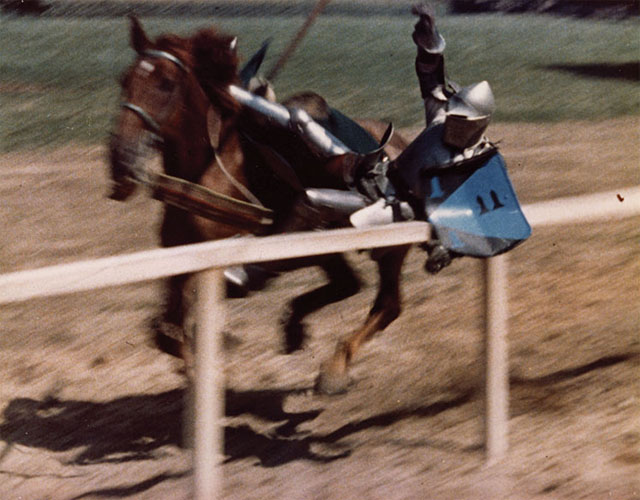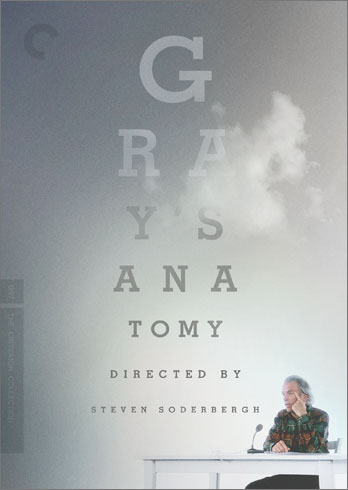In a double feature of sorts, somewhat along the lines of Reverse Shot‘s occasional Shot/Reverse Shot pairings, Film Comment is running two essays by B. Kite (a brief text and a 25-minute video) on Robert Bresson with a response by Kent Jones.
B. Kite: “I can’t think of another artist whose work I’ve engaged as often or for as long where the basic question ‘what interests him/her?’ remains so alive and elusive—every time I return to the films, my answers are different, sometimes slightly, sometimes radically. I think this may in part be because Bresson’s work, and the later films in particular, seems to perform some alchemy of opposed elements: His narrative structures, considered in outline, often have the feel of theorems (though in proof of ??), while their realization seems wholly invested in process.”
Kent Jones: “Just as the ‘two-fisted Bresson’ is a little misleading, so is the strictly process-oriented Bresson. I think a lot of the initial ‘Bresson is [X]’ stuff (austere, Jansenist, minimalist, and so on) was a way of coping with his utter strangeness within the context of film culture in the ’60s and ’70s. The current (but maybe close-to-exhausted?) ‘Bresson is not [X]’ pronouncements strike me as something else again, namely a manifestation of the reflexive discomfort in certain pockets of Western intellectual culture with Christianity.”
Another publication—here, Transit: cine y otros desvíos—another collaborative text with accompanying video—here, by Adrian Martin, Covadonga G. Lahera, and Cristina Álvarez López. “Scream Presence” explicates three categories of the modernist cry, filing a slew of titles into each.
Reading. “Kenneth Lonergan’s Thwarted Masterpiece” is the title of Joel Lovell‘s backgrounder on Margaret, the legal and artistic tangles that stretched on for six years, and the two cuts to be released on DVD on July 9: “How did the guy who wrote and directed You Can Count On Me—and who, moreover, has been arguably the most important American playwright of the last 20 years—get so lost in the forest of his own film? And if the process was as acrimonious as it is said to have been, what did that do to him, personally and creatively? How does an artist recover from that? Does he recover at all?”
Criterion is releasing Steven Soderbergh and Spalding Gray’s Gray’s Anatomy (1997) on DVD and Blu-ray today. Amy Taubin for Current: “Similarly prolific, Soderbergh and Gray could be two sides of the same coin in terms of their creative processes. Gray always dug in the same hole, but from slightly different angles—or to put it less metaphorically, he discovered in each succeeding piece that new experiences inevitably churned up and were filtered through the same trove of childhood memories. Gray was the opposite of a character actor, although he could be an excellent mimic for a moment or two when he wanted to evoke an encounter between himself and someone else within a first-person monologue, in which he always played ‘Spalding.’ Soderbergh, on the other hand, is the ultimate anti-auteurist auteur, determined never to repeat himself, or anyone else.”
Related: Nell Casey, editor of The Journals of Spalding Gray, on Soderbergh’s And Everything Is Going Fine (2010).
“Operating in near-anonymity out of Japan, with little festival or international distribution, [Nobuhiro] Yamashita has forged a consistently funny and bittersweet body of work that is deserving of a vastly wider audience,” argues R. Emmet Sweeney at Movie Morlocks.
“To coincide with its annual conference, taking place in Lisbon from tomorrow, the European Network for Cinema and Media Studies (NECS) has just launched its new online and open access journal NECSUS,” notes Catherine Grant. “It has been added to Film Studies For Free‘s permanent listing of online and open access film and media studies journals.” This first issue features Jacques Rancière and a special section: “Crisis.”
In other news. “To celebrate the 80th anniversary of the Venice International Film Festival (1932-2012), the next edition will feature ’80!,’ a retrospective of ten films (seven feature-length films and three short/medium-length films) presented during past Venice Films Festivals. The films were selected on the basis of rarity, using the copies from the Collections of the Historic Archives of the Contemporary Arts of the Biennale (ASAC).” Titles include work by Raúl Ruiz, Vera Chytilová, Carlos Saura and more.
Meantime, at the Playlist, Oliver Lyttelton takes a “look at the possible contenders for a place at one of the world’s most prestigious festivals,” ranging from “Strong Possibilities” (e.g., Paul Thomas Anderson’s The Master) to the “Long Shots” (e.g., Quentin Tarantino’s Django Unchained).
In the works. “Sony Pictures Classics has picked up the North American distribution rights to Pedro Almodóvar’s latest project, a comedy titled I’m So Excited.” Borys Kit in the Hollywood Reporter: “The movie is set to begin production in July and will star a cast of Spanish actors including Javier Cámara, Cecilia Roth, and Lola Dueñas, among others, who are not readily known to American audiences. Internationally known Penélope Cruz, Antonio Banderas and Paz Vega are also in the film, although their contributions are described as ‘special collaborations.'”
Jon Hamm may join Larry David in a partially improvised comedy to be directed by Greg Mottola, reports Oliver Lyttelton at the Playlist.
For news and tips throughout the day every day, follow @KeyframeDaily on Twitter and/or the RSS feed. Get Keyframe Daily in your inbox by signing in at fandor.com/daily.





